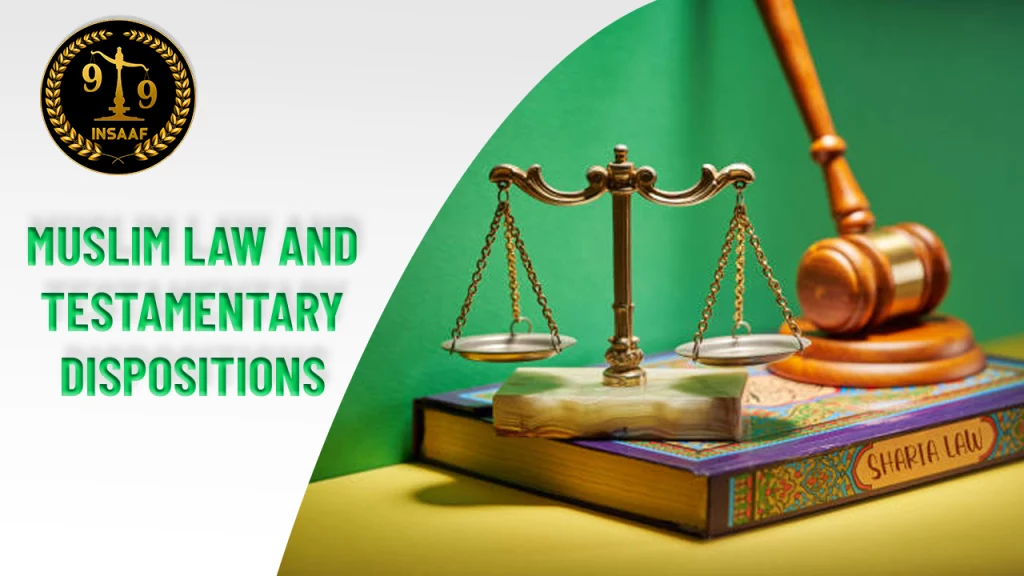

Online Legal Advice from Insaaf99® Online Lawyer Consultation in India


Online Legal Advice from Insaaf99® Online Lawyer Consultation in India

Under Muslim Law, the concept of "Wasiyat" or will is imbued with profound significance. Just as an artisan constructs a masterpiece, Muslims have the privilege of crafting their legacy through a well-written will. This essential instrument enables them to distribute their worldly possessions with care and precision, ensuring that their cherished wealth is distributed to deserving successors and loved ones.
Not only does a meticulously crafted will adhere to the precepts of the Almighty, but it also respects the wishes of the individual who drafted it. As masters of their own destinies, Muslim law embrace the Prophet's guidance and demonstrate their commitment to justice and equity through their bequests.
A will is a powerful tool that can be used to ensure that one's wishes are carried out after death. It can also be used to provide for loved ones and to support charitable causes. In Islam, the will is considered to be a religious obligation, and it is important to make sure that it is properly drafted and executed.
In Islam, a will (wasiyat) is a spiritually and legally significant act. It symbolizes a Muslim's acceptance of the transience of life and their duty as trustees of Allah's bounty. Writing a will is an act of humility, seeking Allah's favor, and leaving a legacy of virtue.
A will allows Muslims to donate up to one-third of their wealth outside of the strict inheritance rules (faraid) to meet specific needs or philanthropic wishes. A well-drafted will can prevent family disputes and ensure that the testator's wishes are carried out. A valid will, with competent witnesses and meeting legal requirements, provides peace of mind to loved ones and confirms the testator's final wishes.
A will harmonizes the transient world with eternal faith, allowing Muslims to change lives beyond their lifetime through just and compassionate distribution of assets. Muslims leave a legacy of kindness, inspiring future generations to follow their spiritual path.
Wills, or "Wasiyat," are crucial in India's fascinating Muslim personal laws. Wasiyat must dance to the tune of Islamic ideas and essentials to be legal. Islamic fairness and justice should influence the testator's wishes. Competent witnesses validate the sincere will poems as the curtains rise on this legal stage. The script emphasizes the testator's voluntary composition without force. Registration is optional but provides a magical layer of security. These features make the Wasiyat a masterpiece, protecting the testator's legacy, illuminating their loved ones' path, and etching a compelling statement of faith and devotion.
Muslim law distinguishes between Will and Faraid. Wasiyat lets Muslims choose beneficiaries for up to one-third of their assets. Faraid automatically distributes the wealth to legal heirs according to Islamic law's prescribed shares. Wasiyat is valid after death and can be canceled or changed during the testator's lifetime. Faraid, however, is rigid, irrevocable, and applies automatically. They provide a complete Muslim law framework for just and tailored asset allocation.
The executor plays a pivotal role in scrupulously carrying out the testator's final wishes. The executor manages the estate's assets, liabilities, and legal responsibilities. They respect the wishes of the testator by distributing assets to beneficiaries with communication, openness, and objectivity. The executor resolves potential conflicts with competence. They manage legacy transitions with responsibility and meticulous documentation. This virtuoso performs the testator's symphony of generosity and affection, leaving the recipients with a memorable melody.
Muslim law wills often include executors, charitable bequests, and particular bequests. Islamic law restricts distribution to one-third of the inheritance through Wasiyat, Faraid, and illicit bequests. Muslims balance tradition with personal wishes to follow Islamic values of fairness and justice. Understanding these traditions and constraints lets them write wills that reflect their ideals, leaving a good legacy for their loved ones and the community.

Witnesses verify that the testator signed the will voluntarily and without compulsion, proving its legitimacy. Registering a will creates an official record that can be used in court. These measures respect the testator's wishes and streamline wealth distribution. Witnesses and registration reassure loved ones and avoid conflicts by validating the will. Adopting these practices is consistent with Islamic values, fostering a fair and reasonable will that respects the testator's intentions and leaves a legacy.
Muslim law makes contesting a will a careful balance of rights and duties. Legal heirs may question the will's legality. Lack of testamentary ability, rumors of compulsion, and falsification are grounds for contestation. They start legal actions with a solemn petition and proof. A convincing story is needed to prove the will's genuineness.
When writing a Wasiyat (will), consult legal experts and Islamic scholars. Legal professionals guarantee the will follows local laws, ensuring its legitimacy and efficacy. Islamic scholars advise on complying with religious requirements and lawful bequests. Research, recommendations, and consultations find qualified professionals. Working with legal and religious experts creates a thorough and meaningful will that preserves the testator's legacy, respects their values, and clarifies for beneficiaries. These specialists help people write a will that reflects their values and lasts for generations.
Insaaf99, an online legal consultation firm, stands as a trusted ally for individuals seeking guidance on Will-related issues under Muslim law. With a team of skilled legal experts, the platform provides personalized assistance to ensure a well-crafted Wasiyat (will) or contesting a will.
Insaaf99's legal professionals offer comprehensive knowledge of estate planning and local laws, ensuring the will's legality and validity. They navigate complexities, safeguarding the testator's intentions and assets from potential challenges.
With ease of access and consultation, Insaaf99 empowers clients to create a meaningful and lasting legacy, leaving beneficiaries with clarity, fairness, and peace of mind in the face of sensitive Will-related matters.
Also Read